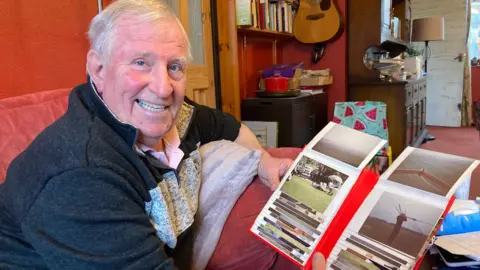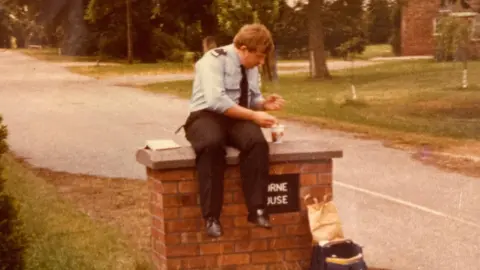Miners' strike PC's sympathy for mineworkers
 BBC
BBCA former police officer who was sent to police picket lines during the miners' strike in 1984 said he still had sympathy for the plight of miners at the time.
Bob Hughes, 69, from Weobley, Herefordshire, was a West Mercia PC when the industrial action rocked Britain.
He worked 16-hour days at pits across the country, spent 30 weeks away from his family and compared it to working in a warzone.
"There was a definite empathy for them," he told BBC Hereford & Worcester.
March marks 40 years since the start of the strikes which were an attempt to prevent the closure of coal mines.
About three-quarters of the country's 187,000 miners went on strike and thousands of officers were sent to the picket lines, with violence breaking out at times.
In one incident, Mr Hughes said he was shot with an air rifle but was protected by a fire extinguisher strapped to his back.
"I got back - I did not feel a thing while we were out there - I took the fire extinguisher off and there was an air rifle pellet imbedded in the webbing of the pack."
"It is not on the same scale, I know, but it was much like the fighter pilots during the last war," he added.
"When they sat on the ground, they waited twiddling their thumbs waiting for something to happen.
"Then all of a sudden, you go from this lethargy and you have to turn it on like that."
- Why the 1984 miners' strike began and how it ended
- Miners' Strike: A Frontline Story
- The Miners' Strike: Return Journey
Mr Hughes, who was 29 at the time, was sent to Nottinghamshire on 16 March 1984 to a pit called Clipstone.
"The bobbies that went up there were away for the best part of a year," he recalled.
"That destroyed and damaged a lot of marriages because the wife was left alone with the kids, doing all the stuff you would have normally done as a couple.
"You have to bear in mind there were no mobile phones so the only times I could get in touch was using one of the telephones.
"The unwritten rule was you only got 10 minutes."
 Bob Hughes
Bob HughesThe miners' eventual defeat was the end of an era for Britain's trade union movement and helped cement Mrs Thatcher's reputation as the Iron Lady.
It paved the way for the privatisation of more nationalised industries and utilities, including steel, railways, gas, telecoms and water.
A wave of pit closures followed the strike and almost all of the UK's deep coal mines were shut within the next 20 years.
Follow BBC West Midlands on Facebook, X and Instagram. Send your story ideas to: [email protected]
